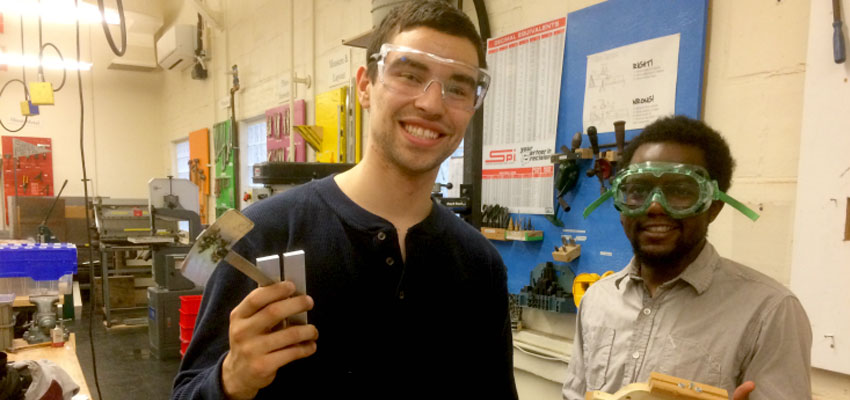
Friday, May 12, 5:00-7:00 pm - D-Lab, MIT N51 3rd floor
Students from D-Lab: Design, D-Lab: Earth, D-Lab: Education and Learning, D-Lab: Energy, D-Lab: Field Research, D-Lab: New Economies, D-Lab: Prosthetics, D-Lab: Water and Climate Change, and Humanitarian Innovation: Design for Relief, Recovery, and Rebuilding presented projects, in addition, to fellows and UROPs. Instructors gave brief presentations and attendees viewed all the posters and working prototypes on display throughout the D-Lab space!
D-Lab: Design
Addresses problems faced by underserved communities with a focus on design, experimentation, and prototyping processes. Instructor: Matt McCambridge
- Bamboo bicycle frame, Bamboo Bicycles Beijing, China
- Desert sand wheelchair, D’Kar Innovation Center, Botswana
- Mango seed oil press, Mango Tango Naboye, Zambia
- Off-grid forge, D’Kar Innovation Center, Botswana
- Pediatric standing frame, STAND Haiti, Haiti
D-Lab: Energy
Offers a hands-on, project-based approach that engages students in understanding and addressing the applications of alternative energy technology in developing countries where compact, robust, low-cost systems for generating power are required. Instructors: Libby Hsu & Amit Gandhi
- Design of a High Thermal Insulation Material for Cookstoves, Uganda
- Design of an Improved Metal Liner for Makaa Cookstoves, Uganda
- Desalination Solutions for the Salt Farmers of Gujarat, India
- Improved Impeller Design for an Affordable Solar Pump, India
D-Lab: Field Research
Designed for students preparing to conduct research abroad for theses, product design project, or development ventures, in which they practice a set of key research skills particularly applicable to conducting research involving people and communities in the context of development. Instructor: Elizabeth Hoffecker
- STG/One Power Impact Strategy, STG International, Lesotho
- Saathi Pads Impact Strategy, Saathi Pads, India
D-Lab: Earth
A hands-on, multi-disciplinary exploration of the dynamic nexus between global biodiversity and human well-being. Instructors: Susan Murcott & Ariel Phillips
- Cuba's Sustainable Agriculture, Cuba
- Iluminate, USA
- Agroforestry Carbon Sequestration in Northern Ghana, Ghana
- Citronella Oil Extraction through Low-Cost Steam Distillation, Ghana
- Methylmercury Health Impacts on Indigenous Tribes in Canada from Hydroelectric, Canada
D-Lab: Education & Learning
Explores learning in the international development context and how innovative approaches and researched best practices can overcome challenges such as limited resources, language barriers, large class sizes, and entrenched pedagogy. Instructors: Jessica Huang & Lisa Nam
- Translating teacher training into classroom practice in Ghana, Practical Education Network, Ghana
- Inquiry-based electrical engineering curriculum with Bangladeshi middle school students, JAAGO Foundation, Bangladesh
- Curriculum applying data visualization and collection to weather and agricultural sensor data, C-Innova, Colombia
- Waste-Free Myanmar curricular collaboration, Waste-Free Myanmar, Myanmar
- After school vocational training and youth action research, Path to Knowledge, Nicaragua
D-Lab: New Economies
Explores the ideas behind, and actions toward alternative economic systems aimed at reclaiming the power to control and build inclusive local and regional economies; secure rights to food, water, land, and healthy environments; build resilience; restore value systems; and ultimately to improve the quality of life. Instructors: Libby McDonald & Kate Mytty
- Local economy in Ésteli, Nicaragua
- Food Justice, Nuestras Raices, Holyoke, Massachusetts.
D-Lab: Prosthetics
Addresses issues on the basics of human biomechanics, types of disabilities, and available technologies for physical rehabilitation. Topics include prosthetic devices for upper and lower extremities, as well as both developed and developing world techniques for overcoming these disabilities. Instructors: Matt McCambridge & Bryan Ranger
- Transfemoral rotator design for manufacturing Mobility India, Jaipur Foot Organization, India
- RIckets Orthotic Device, STAND, Haiti
- Cane to standard fitting adapter, Rise Legs, India
- Knee testing device, Transitions, Jaipur Foot Organization, Guatemala, India
- Cosmesis, Rise Legs, India
- Shock-absorbing pylon, Jaipur Foot Organization, India
D-Lab: Water Climate Change
By 2025, more than half of the countries in the world could be experiencing water stress or scarcity. Water stress and scarcity are exacerbated by climate change. This class is about real-world answers to climate change as it relates to water. Instructors: Susan Murcott & Julie Simpson
- Greening of Kresge Lawn, USA
- In an Oyster Shell, USA
- Flocktracker - smart phone tool for surveying water & climate change impacts, Global
- Communicating Climate Change to a Broad Public, Global
- Expert Surveying of Water Infrastructure in Nine Cities, Bangladesh & Pakistan
- Allston I-90 Green Stormwater Project, USA
- Flood Mitigation Tool & Users Manual, Global
- Aquateca, Pure Home Water, GhanaGhana (Anselmo Cassiano, fellow)
Humanitarian Innovation: Design for Relief, Recovery, and Rebuilding
Explores the role innovation can and does play in how humanitarian aid is provided, and how it can change people, products, and processes. Instructors: Amy Smith & Martha Thompson
- Increasing safety for South Sudanese women in refugee camps, Northern Uganda
- Providing Economic Opportunities for Refugee Youth in Athens, Greece
- Reducing Tensions between Syrian Refugees and Host Communities, Lebanon
Biomass Fuels and Cookstoves Group
Research on cleaner-burning fuels and cookstove technology. Lead Research Scientist: Dan Sweeney
- The Makaa Project: Co-Design, Performance Testing, and Techno-Economics to Improve a Ugandan Charcoal Cookstove (Lauren Bustamante, master's thesis project)
Mobile Technology Group
Lead Research Scientist: Rich Fletcher

